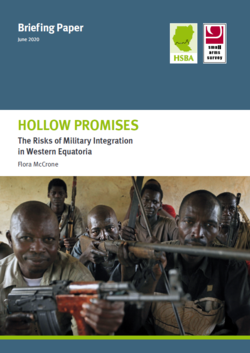
New HSBA Briefing Paper - Hollow Promises: The Risks of Military Integration in Western Equatoria
New HSBA study finds military integration processes in South Sudan trigger new sources of insecurity.
In 2018, the Government of the Republic of South Sudan (GoSS), the Sudan People’s Liberation Movement-in-Opposition (SPLM-IO), and the South Sudan Opposition Alliance (SSOA) signed the Revitalized Agreement on the Resolution of the Conflict in the Republic of South Sudan (R-ARCSS). As part of the transitional security arrangements within the R-ARCSS framework, all warring parties agreed to assemble combatants in designated cantonment sites to facilitate their training, and later, integration into a new ‘unity’ army or other national security services. A new Briefing Paper from the Small Arms Survey’s Human Security Baseline Assessment for Sudan and South Sudan (HSBA) project examines the process of cantonment and the challenges in operationalizing the Agreement.
Hollow Promises: The Risks of Military Integration in Western Equatoria describes the transitional security arrangements of the R-ARCSS and the scope of force sizes to be cantoned. It follows with a case study of Western Equatoria’s Arrow Boys, demonstrating how their involvement exposes some of the fault-lines within the broader integration process. The Briefing Paper finds that the implementation of the R-ARCSS is leading to deteriorating local security, community cohesion, and stability.
For media enquiries, please write to: media@smallarmssurvey.org
- Download Hollow Promises: The Risks of Military Integration in Western Equatoria
- For more about Sudan and South Sudan:
- New: South Sudan Actors and Alliances Map
- Diaspora in Despair: Darfurian Mobility at a Time of International Engagement
- Sudan Uprising: Popular Struggles, Elite Compromises, and Revolution Betrayed
- Conflict and Cooperation: Transitions in Modern Ethiopian–Sudanese Relations
- Insecure Power and Violence: The Rise and Fall of Paul Malong and the Mathiang Anyoor
- Displaced and Immiserated: The Shilluk of Upper Nile in South Sudan’s Civil War, 2014–19
- Learn more about the HSBA project